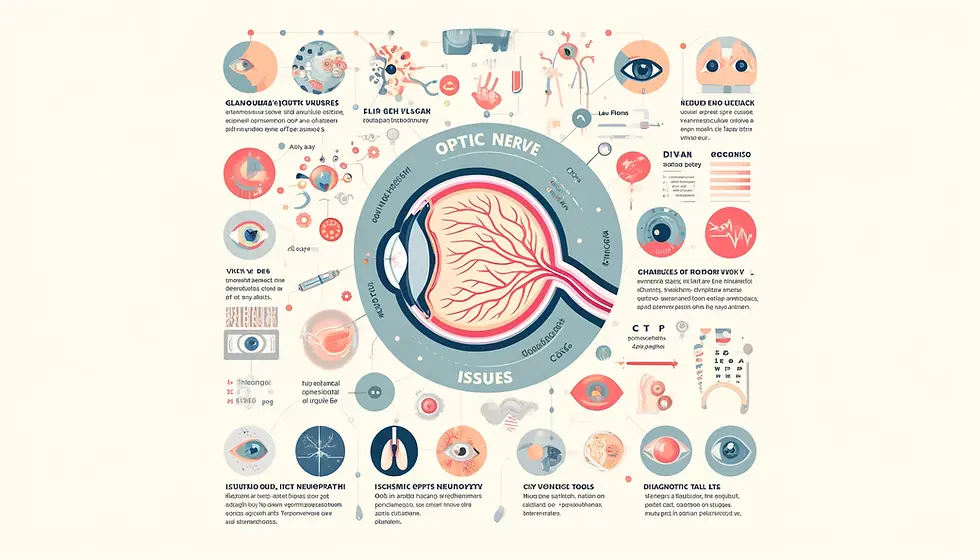Optic Nerve Symptoms Causes Diagnosis and Treatment
- Doctoury
- May 8, 2024
- 2 min read
Updated: Mar 8
Optic Nerve Symptoms Causes Diagnosis and Treatment
The optic nerve is a crucial component of the visual system, responsible for transmitting visual information from the retina to the brain. Understanding the symptoms, causes, diagnosis, and treatment methods related to optic nerve issues is vital for maintaining good vision and addressing any problems effectively.
Symptoms of Optic Nerve Issues
The symptoms of optic nerve damage or dysfunction can vary but typically include:
Loss of vision: This may be partial or complete, depending on the extent of the damage.
Visual field loss: Patients may experience blind spots or decreased peripheral vision.
Changes in color vision: Damage can lead to colors appearing washed out or less vibrant.
Pain: Some conditions affecting the optic nerve, like optic neuritis, may cause pain, especially when moving the eyes.
Flashing lights: Some people see flashing lights due to the stimulation of the optic nerve.

Causes of Optic Nerve Damage
Optic nerve damage can be caused by various factors, including:
Glaucoma: The most common cause, where increased pressure in the eye can lead to optic nerve damage.
Optic neuritis: An inflammation of the optic nerve, often associated with autoimmune disorders like multiple sclerosis.
Trauma: Physical injury to the eye or head can damage the optic nerve.
Ischemic Optic Neuropathy: A condition caused by reduced blood flow to the optic nerve, often related to aging or systemic health problems.
Hereditary conditions: Such as Leber's hereditary optic neuropathy.
Diagnosis of Optic Nerve Issues
Diagnosing optic nerve problems involves several tests and procedures:
Eye exam: A comprehensive examination by an eye doctor using tools like an ophthalmoscope to look at the optic nerve.
Visual field test: This test measures peripheral vision and can identify areas where vision may be lost.
Optical Coherence Tomography (OCT): This imaging test provides cross-sectional pictures of the retina and can show changes in the optic nerve.
MRI or CT scans: These imaging tests can help identify abnormalities around the optic nerve and assess for potential causes like inflammation or tumors.
Treatment Methods for Optic Nerve Damage
Treatment for optic nerve issues depends on the underlying cause:
Medications: For conditions like optic neuritis, steroids can reduce inflammation and aid recovery.
Surgery: In cases of trauma or glaucoma, surgical interventions may be necessary to relieve pressure or repair damage.
Vision aids: For irreversible vision loss, tools like magnifiers or special glasses may help maximize remaining vision.
Monitoring and management:Regular check-ups are crucial for conditions like glaucoma to manage eye pressure and prevent further damage
Conclusion
Issues with the optic nerve can significantly affect vision and quality of life. Early detection and appropriate treatment are crucial for preserving vision and managing symptoms effectively. If you experience any symptoms of optic nerve damage, consulting an eye care professional is essential. Regular eye exams are recommended to detect potential problems early and keep your eyes healthy.
Comments